- Home
- Al Sarrantonio
Halloweenland Page 6
Halloweenland Read online
Page 6
“Shit.”
Another moan followed, and Grant slowly trudged up the stairs to the second floor of the house. There was a short hallway with two bedrooms and a bath off it. He passed the bath and his own bedroom and stood in the doorway of the other, sipping scotch.
Marianne Carlin lay on her back on the guest bed, the covers kicked aside, half-asleep.
Her belly under her nightgown was huge.
As Grant watched, she moved her head from side to side, eyes closed, and moaned again. Grant thought he saw something move in her belly, like a snake under a sheet.
Grant went to the bed, put his glass down on the bedside table and picked up the washcloth that lay folded on the edge of the water bowl there and dipped it into the water. He wrung it out and patted the young woman’s forehead with the cloth.
Marianne mumbled something in her sleep, the name, “Jack,” then wrenched herself over onto her side away from him and began to softly snore.
Grant rearranged the covers over her, folded the washcloth back on the edge of the bowl, retrieved his alcohol and left.
Another movie brought him to lunchtime—a grilled cheese sandwich—and then two more short old westerns got him to four o’clock in the afternoon. The schools were out by now, and the younger trick-or-treaters would start soon. He went upstairs to check his candy bowl by the front door, and for good measure added another bag to it, which made it overflow. He picked up the fallen Snickers bars and put them in his pocket.
He glanced outside and saw that the sun had lost its all-day fight with the gray clouds and was dropping, a pallid orange ball, toward the western horizon.
A porch light flicked on at the house across the street, which seemed to trigger a relay—two more houses lit up, one of them with tiny pumpkin lights strung across its gutter from end to end, the other with a huge spotlight next to the drive illuminating a motor-driven, wriggling spider in a rope web arranged in the lower branches of a white birch.
Back in the basement, Grant noted that the pumpkins on his back neighbor’s deck railing were now lit, flickering frowns to smiles.
He tried to watch another movie, but his palms had begun to sweat.
Upstairs, the doorbell rang. He went up to answer it. Two diminutive sailors, one with a pirate’s eye patch, looked up at him and shouted, “Trick or treat!” They thrust their near-empty bags up in a no-nonsense manner, glaring balefully at him.
He gave them each two candy bars, and they turned immediately and fled sideways across his lawn to the next house. Grant was closing the door as a mother, parked watchfully in a Dodge Caravan at the curb, began to shout, “Use the sidewalk, Douglas . . . !”
The van crept up the street, following Douglas and his fellow pirate.
As Grant was stepping back downstairs the doorbell rang again, and soon he was sitting in the living room with the lights out, smoking his second cigarette, waiting for the bell to ring.
It did, again and again: hobos, men from Mars, ballerinas followed by more hobos.
There was a lull, and Grant went into the kitchen, made another grilled cheese sandwich for dinner.
The doorbell rang again.
Abandoning the grilled cheese sandwich, Grant grabbed a handful of candy bars, yanked open the door—
Petee Wilkins was standing there, snuffling, looking at the ground. There was something in his right hand, which he jerked up—
Instinctively, Grant twisted aside as Petee’s eyes briefly met his and the gun went off. It sounded very far away and not very loud. But it must have been a better handgun than Grant assumed, because the slug hit him in the side like a hard punch. As Grant kept twisting, falling into the candy basket and to the ground, he heard Petee hitch a sob and cry, “I’m sorry!”
Then Petee was gone.
Grant lay stunned, and waited for pain to follow the burning sensation of the bullet.
It came, but it wasn’t as bad as he feared.
As he sat up, a lone trick-or-treater, dressed in some indeterminate costume that may have represented Mr. Moneybags from the board game Monopoly, complete with miniature top hat, stood in the doorway looking down at him. He said the required words and Grant fumbled on the ground around him and threw a handful of candy bars his way.
“Gee, thanks, mister!” Mr. Moneybags said, and ran off.
Grant scooped as much of the candy around him as possible out through the doorway, then stood up with an “Oooof” and, holding his side, kicked the door closed.
He limped into the kitchen and had a look.
There was blood on his hand, which was not a good sign, but there wasn’t a lot soaked into his shirt, which was. He pulled his shirt out of his pants, took a deep breath, and studied the wound.
Just under the skin, left side, in and out, looking clean. He knew he would find the slug somewhere in the front hallway.
“Thank you, Petee, you incompetent asshole,” he whispered, and cleaned the wound at the kitchen sink as best he could. He tied three clean dish towels together and girded his middle.
The blood flow had nearly stopped already.
The front doorbell rang, but he ignored it.
He called the police dispatcher, whose name was Maggie Pheifer, identified himself, told her to have a patrol car visit Petee Wilkins’ father’s house, where they would probably find Petee Wilkins hiding under his own bed. “Consider him armed and dangerous, just in case. I’ll call back in later.”
From upstairs came a moan, louder than the others.
“Shit,” Grant said and, taking a deep, painful breath, hobbled to the stairs and limped his way up.
CHAPTER TWENTY-THREE
Marianne Carlin’s eyes were wide open. She lay pushed back on the bed, knees apart. She was breathing in short little gasps.
“Hello, Detective,” Samhain said calmly from the foot of the bed, where he floated like a wraith. “I see Petee didn’t do his job, which is just as well. I really didn’t want you dead, only . . . incapacitated.”
Grant felt suddenly short of breath, leaned against the doorjamb. He slid down to the floor, staring at Samhain.
“My, my,” Samhain said, “Petee seems to have done a fine job at that.”
“What do you want, Samhain?” Grant said, gasping. There was a growing pain in his left side, which wasn’t going to go away.
Samhain said nothing, staring at Marianne Carlin, who gave a moan and arched her back.
“You want the baby,” Grant said.
“Yes,” Samhain said simply.
“Why?”
Again the wraith was silent as Marianne threw her head back in pain. Grant wanted to help her but felt as if his body was filled with lead. He could barely lift his left arm.
“Do you know what ghosts are, Detective?” Samhain said, quietly. “It happens now and then that someone on the way to my realm from yours gets . . . caught in the middle. These are usually very strong personalities. Often, there is something very important that they are leaving behind. Unfinished business, if you will.
“This was very fortuitous for the one I serve. Let us say we have been . . . waiting for this to happen. And let us also say that my master was able to . . . make use of it.”
Samhain stood silent vigil at the foot of the bed, staring at Marianne Carlin in a kind of wonder.
Grant said, “The baby is from your world.”
“Oh, no, Detective. This child is from someplace far worse than Death. This child is something far worse than Death.”
Grant gasped, gathered his strength. “What have you done?”
Samhain turned a mild, almost fond, look on Grant. “I serve, nothing more. And after many tries, over many years, the one I serve, the Uncreator, will finally enter this world . . .”
His attention was brought back to Marianne, whose cries were coming more closely together. Her stomach was taut with effort, her legs spread impossibly wide.
“It will not be long now . . .” Samhain said, in wonder. He moved up over the foot of the bed to
hover above the birthing woman.
Grant took a deep breath and pushed himself back against the doorjamb. With a supreme effort he stood. For a moment the world went black, but he held his position and when his sight cleared he urged himself forward.
“Don’t interfere, Detective,” Samhain snapped.
“That thing will destroy the world.”
Samhain laughed. “Much more than that, I fear.”
Grant took two halting steps forward and then the pain in his left side flared to broiling heat. He stumbled, reaching out to clutch at the side of the bed as he fell to his knees. He pulled himself up, fighting for breath, to see the crown of a baby’s head appear between Marianne Carlin’s legs.
“Good, Marianne, good!” Samhain urged, as the young woman screamed and arched and pushed.
Grant took a long shuddering breath, put his right hand into his coat pocket, resting it on the butt of his 9mm handgun.
Samhain moved up and closer over the woman, almost alive with excitement.
“Push, Marianne! Push!”
Marianne Carlin screamed. The baby’s head appeared, a gray wrinkled thing with closed eyes and a puckered mouth.
It was followed in a rush of blood by the rest of the body, tiny hands and skinny legs and tiny feet.
Samhain moved over the baby, straightened, his head thrown back, his red mouth opened wide.
“Master!” he cried.
The thing on the bed kicked, and then its tiny mouth and slitted eyes opened.
It looked up at the thing hovering overhead and wailed, a hollow, long, hoarse shriek of joy.
“How delightful—a girl!” Samhain cried.
Grant tightened his grip on the 9mm.
Marianne Carlin was not moving on the bed. There was a frozen look of abject terror on her face, and there was way too much blood.
Instinctively, Grant knew that she was dead.
The thing on the bed, gray and pale and otherworldly, held its tiny hands out to Samhain, and opened its mouth again.
Samhain turned to Grant. “I told you not to interfere,” he hissed.
Grant’s grip loosened on the handgun, and he fell to the floor and saw black.
PART TWO
ORANGEFIELD
FIVE YEARS LATER
CHAPTER TWENTY-FOUR
“Hey, Bill, you see this?”
From his desk, where he sat contemplating walking out into the midmorning heat to smoke a cigarette, Grant swiveled his hooded eyes up at Desk Sergeant Chip Prohman, who was standing in front of him and pointing excitedly to the front page of the Orangefield Herald. There was a drawing of something that looked like a large Ferris wheel centering the page, and a banner headline with the word “Halloween” in it that Grant could not make out.
“What is it?” Grant asked unenthusiastically.
In answer, Prohman held the front page out straight, and now Grant could read the entire headline: HALLOWEENLAND COMING TO ORANGEFIELD!
“What the hell is Halloweenland?” Grant growled.
In answer, the sergeant lowered the paper to Grant’s desk and read, following along with his finger, “ ‘Halloweenland will be the largest Halloween-themed attraction ever mounted in the United States. “It’s a modern descendent of the quaint Halloween Hay rides and monster walks,” said its principal owner, Mr. Dickens. When asked his first name, Mr. Dickens, who, this writer must admit, looked something along the lines of one of his scary attractions, smiled and said, “Just Dickens will do.” ’ ”
Grant grunted. “Just what Orangefield needs, another ghoul.”
Prohman went on, still following with his finger. “ ‘According to Mr. Dickens the theme park, to be built on a fallow piece of land just outside town, will employ some of the latest technology, but will mostly remain true to the traditional carnival Halloween scares and attractions that patrons have come to expect. “Some may find it quaint,” Dickens said, “but I can promise all will find it enjoyable.”
“ ‘Mayor Gergen, when reached for comment, stated that “Halloweenland represents a great leap forward for the Orangefield community. It will put us on the map once and for all as the premiere holiday destination for Halloween.” ’ ”
The desk sergeant paused and took a deep breath, as if reading were great exercise for him. He put his finger back on the story. “ ‘It is estimated that Halloweenland will generate, in its first year, upward of $200,000, some of which would benefit the town. Though the mayor would not give specifics, citing confidentiality, it is surmised that Mr. Dickens was given generous tax breaks to bring his attraction to Orangefield.’ ”
Prohman looked up. “That’s it.”
Grant pulled the paper toward him and turned it around. There was nothing more, and the picture of the Ferris, he noted, was nothing more than a stock drawing from the Bettman Archive.
He pushed the paper back at Chip Prohman, who took it eagerly and went back to his own desk. Grant would have bet a twenty that the fat desk sergeant was thumbing his way to the comics page at this point, where the reading wasn’t such a chore.
Grant turned his eyes back to the classified ads of the Boston Globe, one of a pile of current major city papers on his desk. His cigarette break was forgotten; it would wait till later. His computer screen was on, too, set to one of a list of east coast dailies with online presences.
There was nothing in the Globe, either in the classifieds in answer to the discreet inquiry he’d been running there for more than four years, or in the news section. He dropped the paper onto the pile next to his desk and picked up the New York Times.
He felt eyes on him, and turned to his right to see Captain Farrow’s office door open. The captain filled the doorway, glaring at Grant. “See you a minute?”
It wasn’t a request.
The door closed in dismissal. Grant got up and crossed to it. He could see the captain settling himself behind his desk through the frosted glass as he opened the door and let himself in.
“Sit down,” Farrow ordered.
Grant left the door open and sat in the single chair in front of the captain’s desk.
Farrow steepled his fingers and continued to glare at Grant. His head was completely bald, which somehow accentuated his scowl.
Farrow said, “Have you gotten anywhere with the Pallman burglary?”
Grant shook his head no.
“Why not?”
“Nowhere to go. I’m sure it’s the same two high school morons who broke into that house on Saver Road two weeks ago. There’s only so much—”
“How much time have you logged on it? Mrs. Pallman called and said you spent a total of four minutes at her house. She says she got the feeling that you had better things to do.”
“Your words or hers?”
Farrow’s face reddened. “Actually, mine. I repeat: how much time have you logged on it?”
Grant took a deep breath. “Four minutes.”
To Grant’s surprise, Farrow’s face went placid. He almost looked like he was going to smile. He put his hand on a sheet of paper on his desk. “Thank you for being honest,” he said. “I have your log for the past few months, and it looks like you haven’t been doing much of anything except this”—he waved his hand in dismissal—“five-year-old missing persons case.” His beady eyes locked on Grant’s. “True?”
Grant nodded. “True.”
Before Grant could continue or expand Farrow held his hand up. “I don’t want to hear again how important it is. I don’t want to hear anything. It’s over.”
Grant waited for more, and now Farrow was nervously moving the piece of paper in front of him around.
“You’re fired, Bill,” Farrow said quietly, not looking up. “I cleared this with Mayor Gergen, and with the district attorney. You’ve been drunk on the job eleven times in the past six months, you’ve been ignoring your duties, you’re a mess, it’s done.” His voice fell to almost a whisper. “Get your things together and leave.”
Now he looked at
Grant again, and his eyes were filled with something almost like pity. “Look at yourself, Bill! You need to dry out! You need to stop smoking! You lost your house, you almost lost your car—yes, the finance company called here—you’ve lost almost everything. You can’t be a cop and act like that.”
Something in Grant’s eyes made Farrow look away again. “Please, Bill, just go. Before it gets embarrassing.”
Grant swiveled in his chair to see two burly uniformed cops, Paige and Jenner, standing just outside the doorway.
“We’ll help you with your stuff,” Paige said quietly, staring at the floor.
“There’s just one thing,” Grant said, turning back to look at Farrow. There was sudden quiet in the room. Despite all of the feelings running through Grant—sorrow, rage, regret for the badge he would no longer wear—he almost burst out laughing. The moment was just like one of the classic westerns or Dirty Harry movies he had watched.
The silence stretched, and then Grant said, pulling out his shield and pulling his .38 police special from its holster and placing them on Farrow’s desk, “I’m still a cop.”
CHAPTER TWENTY-FIVE
The boxes of newspapers were under the card table that served as his computer desk. The screen displayed the homepage of the Providence Journal. Grant poured himself two fingers of scotch and put the bottle back down on the packing crate that served as his bar. There was an unmade bed against one wall, his television and DVD player on another packing crate next to the single window. Under the window was his only other luxury, a dorm-style refrigerator that hummed all night and sometimes kept him awake, when he was able to sleep at all. It was filled with beer and a single stick of butter. There were no pictures on the walls, no mementoes, knickknacks, keepsakes of any kind. When he had sold the house he had sold it furnished, by choice. Farrow had been wrong about that—he hadn’t lost his home. He had needed its sale to finance the search, the private detectives, the newspaper subscriptions, the occasional bribe for information—everything. If his nerve center wasn’t much to look at, it was still a nerve center.

 Five World Saga 01 Hornets and Others
Five World Saga 01 Hornets and Others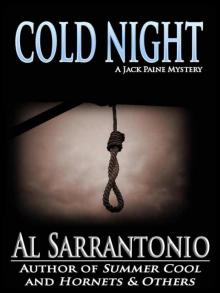 Cold Night (Jack Paine Mysteries)
Cold Night (Jack Paine Mysteries)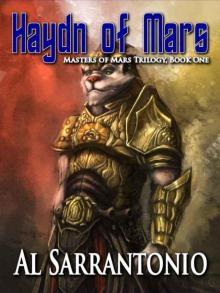 Haydn of Mars
Haydn of Mars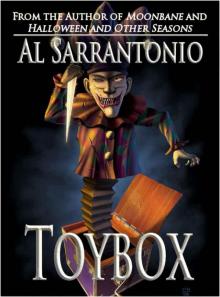 Toybox
Toybox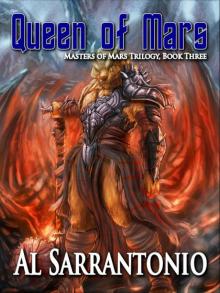 Queen of Mars - Book III in the Masters of Mars Trilogy
Queen of Mars - Book III in the Masters of Mars Trilogy Exile
Exile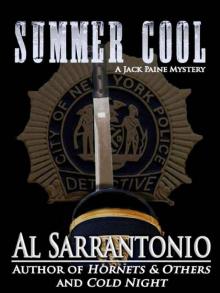 Summer Cool - A Jack Paine Mystery (Jack Paine Mysteries)
Summer Cool - A Jack Paine Mystery (Jack Paine Mysteries) Return - Book III of the Five Worlds Trilogy
Return - Book III of the Five Worlds Trilogy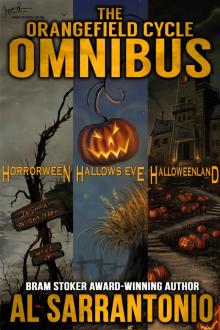 The Orangefield Cycle Omnibus
The Orangefield Cycle Omnibus Summer Cool jp-2
Summer Cool jp-2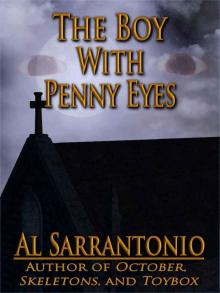 The Boy With Penny Eyes
The Boy With Penny Eyes Journey - Book II of the Five Worlds Trilogy
Journey - Book II of the Five Worlds Trilogy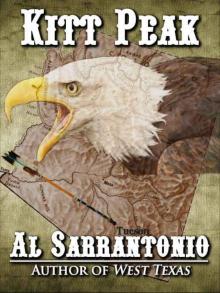 Kitt Peak
Kitt Peak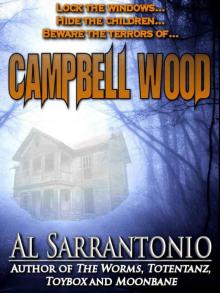 Campbell Wood
Campbell Wood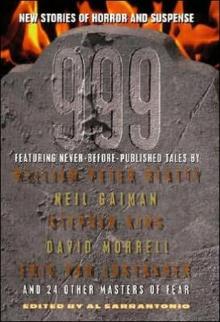 999
999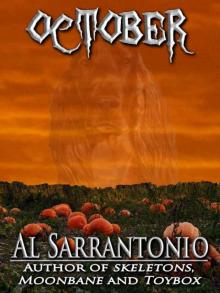 October
October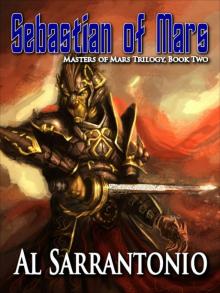 Sebastian of Mars
Sebastian of Mars Moonbane
Moonbane Totentanz
Totentanz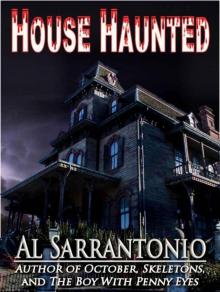 House Haunted
House Haunted Halloweenland
Halloweenland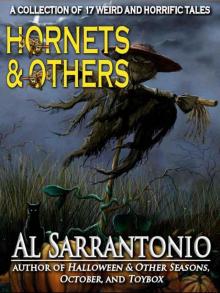 Hornets and Others
Hornets and Others